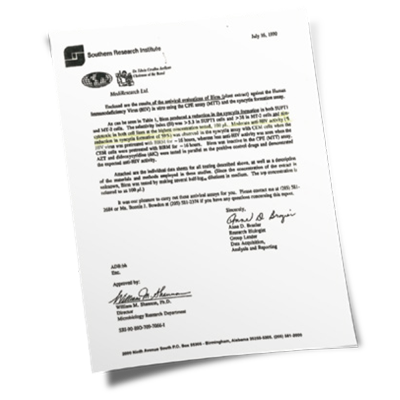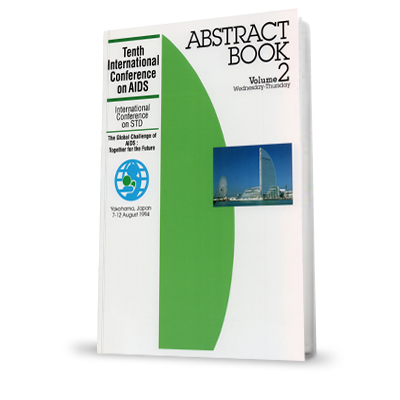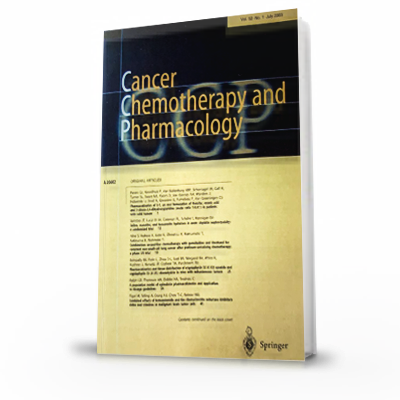Scientific Studies
BIRM® NOW HAS MORE THAN 45 YEARS OF ONGOING RESEARCH BEHIND IT. SCIENTIFICALLY BACKED BY MORE THAN 45 YEARS OF RESEARCH, AND IS THE ONLY IMMUNOMODULATOR THE ONLY IMMUNOMODULATOR WITH AN AMERICAN PATENT,100% NATURAL, SUGAR-FREE AND A POWERFUL ANTIOXIDANT-REJUVENATOR. ANTIOXIDANT-REJUVENATOR.

Southern Research Institute, Results Of Evaluation
1990.
Authors:
Anne D. Brazier
Research Biologist
The results of antiviral evaluations of BIRM® {plant extract) against Human Immunodeficiency Virus (HIV) in vitro using the PE assay (MTT) and syncytium formation assay are attached. As can be seen in Table 1, Birm produced a reduction in syncytium formation in both SUPTI and MT-2 cells. Undue selectivity (IS) was >S.3 in SUPT1 cells and >38 in MT-2 and nin-Eytotuxic cells in both cell lines at the highest concentration assayed, 100 µL. Moderate anti-HIV activity (* reduction in $93 syncytia formation) was observed in the CEM cell syncytia assay when HIV virus was pretreated with BIRM® for ~ 16 hours, whereas less anti-HIV activity was observed when CEM cells were pretreated with BIRM for ~ 16 hours. BIRM® was inactive in the CPE assay (MTT).
AZT and didesoxycytidine (ddC) were tested in parallel as positive control drugs and demonstrated the expected anti-HIV activity. Individual data sheets for all tests described above, as well as a description of the materials and methods used in these studies, are attached. (Since the concentration of the extract is unknown, BIRM® was tested by making several half-log dilutions in the medium. The maximum concentration is known to be 100 pl).

PB0294 BINATIONAL EXPERIENCE IN THE TREATMENT OF AIDS WITH A NATURAL LOW MOLECULAR WEIGHT CARBOHYDRATE (ECA-10-142) AS AN IMMUNE SYSTEM STIMULATOR.
Authors:
Cevallos Arellano Edwin, Chief of the Oncology Clinic of the Hospital Metropolitano de Quito, Ecuador.
Ardila Ardila, Henry, Director of the Liga Colombiana de Lucha Contra el SIDA, Santafé de Bogotá D.C., Colombia.
The study allowed evaluating the stimulating characteristics of the immune system by means of (ECA-10-142), a low weight carbohydrate of natural origin, in 70 patients with stage IV AIDS. For this purpose, 70 patients with confirmed diagnosis of AIDS, 30 Colombians and 40 Ecuadorians, were selected for administration of the drug with (ECA-10-142). Laboratory studies showed that these carbohydrates stimulate the immune system in AIDS patients. The results achieved after 9 months showed clinical improvement regarding signs of the disease, and a remarkable immunological improvement in the levels of immune system cells, mainly CD4 lymphocytes, was also observed. In conclusion, it proved to be an effective stimulator of the immune system in laboratory studies because it inhibits the formation of masses being effective as the clinical and immunological improvement of patients with AIDS.

AN ORALLY ACTIVE AMAZONIAN PLANT EXTRACT (BIRM) INHIBITS PROSTATE CANCER GROWTH AND METASTASIS
2003
Authors:
Devendra S. Dandekar : USA. Department of Urology.
University of Miami Miller School of Medicine
Vinata B. Lokeshwar: USA. Program Director, Biochemistry and Molecular Biology.
Edwin Cevallos-Arellano: ECUADOR. Chief of the Oncology Clinic of the Hospital Metropolitano de Quito.
Mark S. Soloway: USA. Internationally recognized leader in urologic oncology Balakrishna L. Lokeshwar:USA. Chairman in Basic Sciences. Department of Biochemistry and Molecular Biology.
An analysis of the antitumor activity, "BIRM" (biological modulator of the immune response; "Easy Ecuadorian oral solution: an extract of an Amazonian plant"), was carried out in laboratory studies in an animal tumor model. The effectiveness of BIRM was evaluated in rats with subcutaneous tumors, where it was found that the most important results were that BIRM inhibited cell proliferation and cloning, predominant and necessary activities for cancer. The plant extract BIRM has antitumor compounds with potent anticancer activity in laboratory studies against prostate cancer cells.

AMAZONIAN PLANT EXTRACT BIRM REVERSES CHRONIC NEUROPATHIC PAIN IN RAT SCIATIC NERVE CHRONIC CONSTRICTION INJURY MODEL
2015
Authors:
Ravalji, M: INDIA. Experienced in conducting a variety of toxicology studies for regulatory submission, PK/PD, TK studies, development and validation of animal models in various therapeutic areas.
Summary:
The condition of neuropathic pain is still poorly managed by currently accessible therapies. The purpose of the analysis has been to test the effectiveness of the neuropathic pain model in laboratory models of BIRM® to elucidate its anti-neuroinflammatory potential. BIRM was administered orally to animals. Repeated oral administration of BIRM® inhibited pain linked to allodynia and thermal hyperalgesia. Such data indicate that the marketed formulation BIRM® has antineuroinflammatory and antinociceptive characteristics in rats with neuropathic pain and may serve as an adjuvant to standard therapy or as a free therapeutic proxy for the procedure of neuropathic pain disorders.

THE ANDEAN ANTICANCER HERBAL PRODUCT BIRM CAUSES DESTABILIZATION OF ANDROGEN RECEPTOR AND INDUCES CASPASE-8 MEDIATED-APOPTOSIS IN PROSTATE CANCER.
2016
Authors:
Nagarajarao Shamaladevi: USA. CLIA LAB DIRECTOR OF MOLECULAR ANALYTICS
Summary:
BIRM® is an anti-cancer herbal formulation from Ecuador. A previous study established its antitumor and antimetastatic activity against prostate cancer models. The activity of BIRM® against human prostate cancer (PCa) cells was investigated to discover its mechanism of antitumor activity. In androgen receptor (AR) expressing PCa cells BIRM was 2.5-fold (250%) more cytotoxic in the presence of androgen (DHT) compared to cells cultured in the absence of DHT. In AR positive cells (LAPC-4 and LNCaP) BIRM® caused a dose- and time-dependent down-regulation of AR and increased apoptosis. Exposure of cells to BIRM® did not affect the synthesis of RA and RA promoter activity, but increased RA degradation through the proteasome pathway. BIRM® caused destabilization of the HSP90-AR association in LAPC-4 cells. It induced apoptosis in PCa cells by activating caspase-8 through death receptor and FADD-mediated pathways. A synthetic inhibitor of caspase-8 cleavage (IETD-CHO) aborted BIRM-induced apoptosis. The effect of BIRM® on the AKT-mediated survival pathway in both AR+ and AR-negative (PC-3 and DU145) showed a decrease in p-AKTser 473 levels in all PCa cell lines. BIRM dosed by oral gavage in mice with PC-3ML tumors showed selective efficacy on tumor growth; before tumors are established, but limited efficacy when treated in existing tumors. In addition, BIRM® inhibited LNCaP tumor generated by orthotropic implantation in the dorsal prostate of nude mice. Partial purification of BIRM® by liquid-liquid extraction and further fractionation by HPLC showed a 4-fold increase in specific activity in PCa cells. These results demonstrate a mechanistic basis for the antitumor activity of the herbal extract BIRM®.
Keywords: herbal anticancer preparation; androgen receptor; caspase-8; chemoprevention; prostate cancer.

ANTI-OXIDANT ACTIVITY STUDY OF THE IMMUNOMODULATOR PRODUCT "BIRM" Southborough, MA
2018
Background:
Ecuador belongs to the 8 centers of origin of native plants, due to the fact that the predominance of geographical and ecological components offers a vast plurality in its flora. Chemically, polyphenols have the possibility to be divided into some classes, such as phenolic acids, flavonoids, anthocyanins, isoflavones, stilbenes, lignans and tannins (Machu et.al., 2015).

EXTRACT OF AN AMAZONIAN PLANT BIRM DEMONSTRATES ITS NEUROPROTECTIVE EFFECT ON DIABETES-INDUCED NEUROPATHIC PAIN BY MODULATING MICROGLIA CELLS IN THE SPINAL CORD.
2020
Background:
Mital Ravaljia*, Urja Vermaª, Pranav Buchª, Chetan Sharmab, Mukesh Gandharib, Edwin Cevallos-Arellanoc and Suresh Balakrishnª a Department of Zoology, The Maharaja Sayajirao University of Baroda, Vadodara 390 002, Gujarat, India b Biology, GVK Biosciences Pvt. Ltd., Hyderabad 500 076, Telangana, India c Instituto de Tumores, Quito, Ecuador * Corresponding author: Dr. Mital Ravalji Tel: +91 8155061642
Abstract:
Key words: diabetic peripheral neuropathy, neuroimmune balance, microglia cells

GT198 IS A TARGET OF ONCOLOGY DRUGS AND ANTICANCER HERBS.
2021
Authors:
JunfengPang: USA. Researcher on cancer, developmental biology and immunology.
Summary:
Tumor angiogenesis is a hallmark of cancer. Therapeutic drug inhibitors targeting angiogenesis are clinically effective. We have previously identified GT198 (gene symbol PSMC3IP, also known as Hop2) as an oncoprotein that induces tumor angiogenesis in human cancers, including oral cancer. In this study, we show that the GT198 protein is a direct target of more than a dozen oncology drugs and several clinically successful anticancer herbs. GT198 is a DNA repair protein that binds to DNA. Using an in vitro DNA binding assay, we tested the National Cancer Institute's VII-approved oncology drug pipeline containing 129 oncology drugs. The identified GT198 inhibitors include, among others, mitoxantrone, doxorubicin, paclitaxel, etoposide, dactinomycin and imatinib. Paclitaxel and etoposide have higher binding affinities, while doxorubicin has a higher binding efficiency due to competitive inhibition. GT198 shares protein sequence homology with DNA topoisomerases, which are known drug targets, so GT198 is likely a previously unrecognized novel drug target. To search for more potent GT198 inhibitors, we tested several anticancer herbal extracts. The positive anticancer herbs with high affinity and high efficacy are all clinically successful, including allspice,Gleditsia sinensis or honey locust from China and BIRM from Ecuador. Partial purification of allspice using an organic chemical approach demonstrated high feasibility of natural product purification, when activity is monitored by in vitro DNA binding assay using GT198 as a target. Together, our study reveals GT198 as a new targeting mechanism for existing oncology drugs. The study also provides an excellent drug target suitable for compound identification and natural product purification. In particular, this study opens an opportunity to rapidly identify drugs with high efficacy and low toxicity by nature.
Keywords: tumor angiogenesis, oncology drug targeting, anticancer herbs, GT198, oral cancer.
